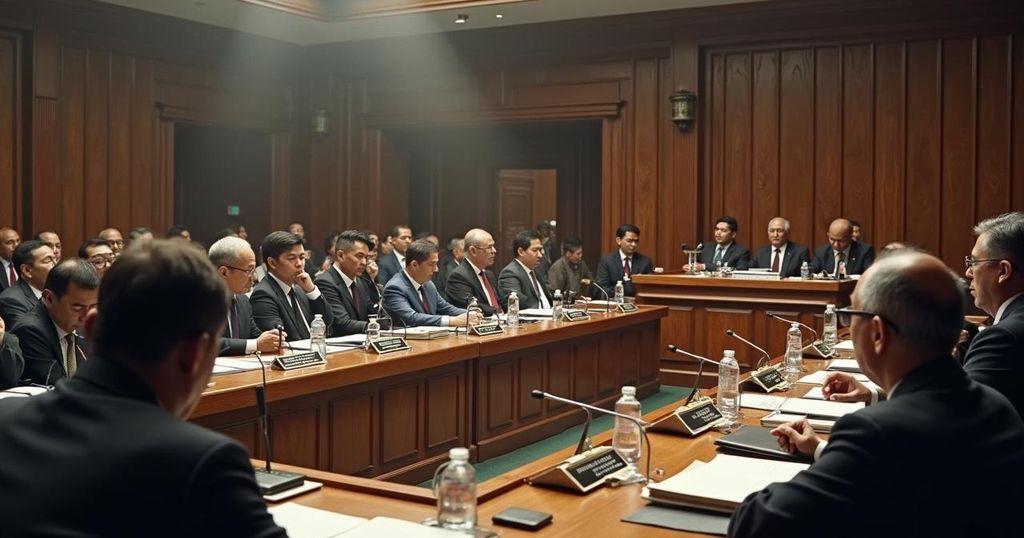International Tribunal Holds Indonesia Accountable for 1965-1966 Mass Killings

On July 20, 2023, the International People’s Tribunal in The Hague found Indonesia accountable for crimes against humanity during the 1965-1966 mass killings of suspected communists. The tribunal identified ten severe human rights violations, including genocide, highlighting military involvement and the state’s failure to prevent these acts. It called for the Indonesian government to apologize, investigate perpetrators, and provide reparations to victims and survivors.
On July 20, 2023, the International People’s Tribunal in The Hague officially declared Indonesia culpable for crimes against humanity stemming from the mass killings that occurred during the 1965-1966 purge, which resulted in the deaths of an estimated 500,000 to one million individuals accused of being communists. The tribunal’s findings specifically address the military-led actions against members of the Indonesian Communist Party (PKI) and their advocates, which facilitated the ascent of Suharto’s New Order regime. The panel of international judges concluded that Indonesia must be held accountable for ten severe human rights violations committed during this time, including acts of genocide against PKI members, their supporters, individuals associated with President Sukarno, and members of the Indonesian National Party (PNI). Presiding Judge Zak Yacoob articulated that, “The State of Indonesia is responsible for and guilty of crimes against humanity consequent upon the commission and perpetration, particularly by the military of that state through its chain of command, of the inhumane acts.” Additional human rights violations identified by the tribunal included systematic acts of destruction, imprisonment, slavery, torture, enforced disappearances, sexual violence, expulsion, dissemination of false information, international complicity, and genocide. Judge Yacoob emphasized that these violations were not isolated incidents but part of a coordinated and systematic assault on the Communist Party and its affiliates, initiated through a campaign of false propaganda. Moreover, the tribunal underscored the ultimate responsibility of the state for the atrocities perpetrated by the military, noting that Indonesia’s government failed both to prevent these actions and to hold accountable those responsible for them. Yacoob remarked, “To the extent that some crimes were committed independently of the authorities… this did not absolve the State from the obligation to prevent their occurrence and to punish those responsible.” In the conclusion of the tribunal’s report, Judge Yacoob recommended that the Indonesian government issue an apology to all victims, their survivors, and families for the crimes committed during the 1965 events. The report called for investigations into the wrongful actions and prosecution of the perpetrators, as well as provisions for appropriate compensation and reparations for victims and survivors. The tribunal further urged the government to rehabilitate surviving victims of the purge, to prevent further persecution by authorities, and to honor the rights guaranteed by both international and Indonesian law.
The 1965-1966 mass killings in Indonesia represent one of the darkest chapters in the country’s history, characterized by a systematic purge of suspected communists and their supporters. Following a failed coup led by the PKI, the Indonesian military launched a broad campaign to eliminate communism, resulting in widespread violence and the deaths of hundreds of thousands. This purge not only facilitated the rise of Suharto’s New Order regime but also left deep scars on the nation’s collective memory and continues to influence contemporary discussions surrounding human rights and historical accountability in Indonesia. The International People’s Tribunal’s ruling aims to bring attention to these historical injustices and initiate a process for acknowledgment and reparative justice.
The International People’s Tribunal’s declaration that Indonesia is responsible for the mass killings of 1965-1966 marks a significant step towards addressing historical injustices and human rights violations committed during this period. The tribunal’s recommendations highlight the need for accountability, reparations, and a formal acknowledgment of the suffering inflicted upon victims and survivors of the purge. By urging the government to apologize and take definitive action, the tribunal seeks to foster healing and ensure that such atrocities are neither forgotten nor repeated.
Original Source: jakartaglobe.id








